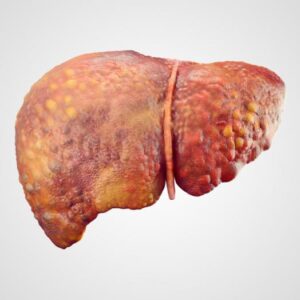Fatty liver disease (steatosis) is the build-up of excess fat in the liver cells and is a common liver complaint in Western countries. It affects about one in every 10 people. It is normal for the liver to contain some fat, but if fat accounts for more than 10 per cent of the liver’s weight, then you have fatty liver and you may develop more serious complications.
Fatty liver may cause no damage, but sometimes the excess fat leads to inflammation of the liver. This condition, called steatohepatitis, does cause liver damage. Sometimes, inflammation from a fatty liver is linked to alcohol abuse. This is known as alcoholic steatohepatitis. Otherwise, the condition is called non-alcoholic steatohepatitis
- Fatty liver disease is a build-up of fats in the liver that can damage the organ and lead to serious complications.
- Risk factors include obesity, a high-fat diet, high alcohol intake and diabetes mellitus.
- In most cases, people with fatty liver disease are encouraged to modify their diets, take regular exercise and lose weight.

Causes of fatty liver disease:
Eating excess calories causes fat to build up in the liver. When the liver does not process and break down fats as it normally should, too much fat will accumulate. People tend to develop fatty liver if they have certain other conditions, such as obesity, diabetes or high triglycerides.
Alcohol abuse, rapid weight loss and malnutrition may also lead to fatty liver. However, some people develop fatty liver even if they have none of these conditions.
Risk factors for fatty liver disease
Most, but not all fatty liver patients are middle-aged and overweight. The risk factors most commonly linked to fatty liver disease are:
• overweight (body mass index of 25-30)
• obesity (body mass index above 30)
• diabetes
• elevated triglyceride levels.
Symptoms of fatty liver disease :
A fatty liver produces no symptoms on its own, so people often learn about their fatty liver when they have medical tests for other reasons. NASH can damage your liver for years or even decades without causing any symptoms. If the disease gets worse, you may experience fatigue, weight loss, abdominal discomfort, weakness and confusion.

